Best Crypto Exchanges in Austria
%2520(2).webp)
Summary: Austrian investors have access to multiple reliable crypto exchanges, both domestic and international, which comply fully with regulations enforced by Austria's Financial Market Authority (FMA) and adhere to the European Union's Markets in Crypto-Assets Regulation (MiCAR).
Here are the six best crypto exchanges accepting deposits in euros (EUR) for Austrian users:
Kraken is our top pick for Austrian investors as it offers a multilingual interface, competitive fees, diverse investment features and is compliant with European MiCA regulations.
Licenses
Regulated across Europe and MiCA compliant
Available Assets
460+ Cryptocurrencies
EUR Deposit Methods
IBAN, SEPA, Cards, Bank Transfers
Top Crypto Trading Platforms in Austria
Austria offers various crypto exchanges regulated by the Austrian Financial Market Authority (FMA) under EU MiCAR standards. This guide highlights the leading crypto exchanges available to Austrian users, comparing key aspects such as Euro deposit methods, trading fees, security standards, supported crypto assets, and essential platform functionalities for traders.
1. Kraken
Kraken is the leading crypto exchange in Austria, attracting traders with its advanced security, extensive features, and multilingual platform. Since launching in 2011, Kraken has grown to serve more than 15 million clients across over 190 countries, with language support for German, French, and English.
Austrian traders have access to an extensive range of services, from basic spot trading to advanced offerings such as margin trading with up to 5x leverage and futures contracts. Both Kraken and Kraken Pro offer sophisticated tools, real-time analytics, and customizable trading interfaces.
Beyond trading, it provides users innovative financial products like "Auto Earn," delivering staking rewards up to 17% APR and commission-free trading on tokenized stocks and ETFs. Its security standards include 24/7 live customer support and regular external proof-of-reserves audits.
Platform Highlights:
- Fees: Fees from 0.16% maker and 0.26% taker; zero-fee trading available with Kraken+ subscriptions.
- Supported Assets: Over 460 cryptocurrencies.
- Regulation & Licensing: Fully compliant with EU MiCA regulations; regulated by European financial authorities.
- EUR Deposit Methods: SEPA, SWIFT, bank transfers, PayPal, credit cards, debit cards.
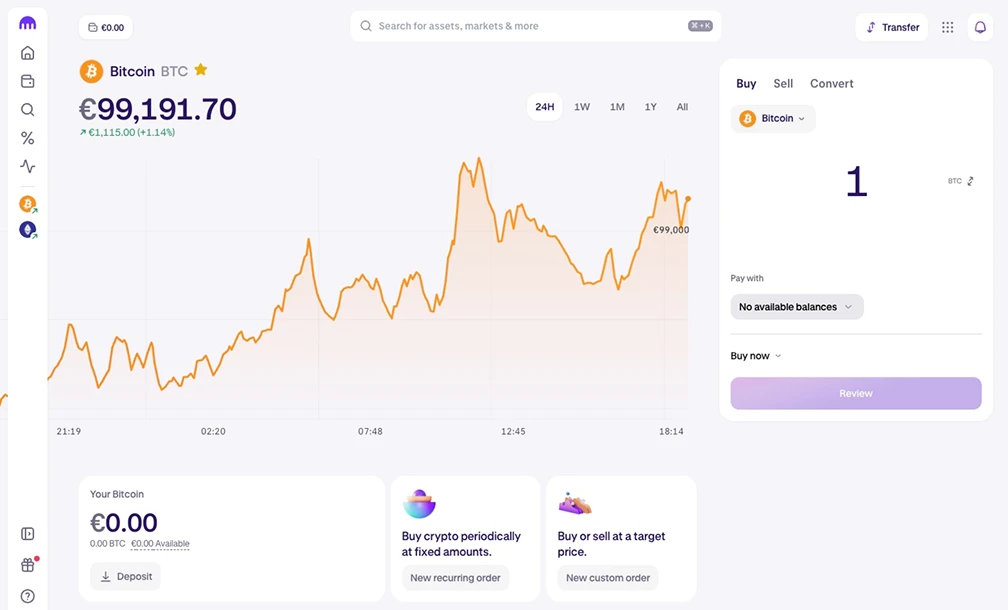
2. Bitpanda
Bitpanda is Austria’s premier cryptocurrency platform, widely recognized for its user-friendly interface, reliability, and robust regulatory compliance. Founded in Vienna, this local exchange now supports over 6 million users across Europe, earning praise reflected by its excellent Trustpilot rating.
Far beyond basic crypto trading, it offers a comprehensive range of investment products, enabling Austrians to diversify effortlessly. Users can buy, sell, and swap cryptocurrencies around the clock, invest in fractional stocks and ETFs, trade physically-backed precious metals, and commodities.
Innovative features like "Crypto Indices" allow users to diversify across the entire crypto market automatically with a single investment. Security is paramount at Bitpanda, with client funds safeguarded in offline wallets, and operations complying rigorously with European regulatory standards.
Platform Highlights:
- Fees: Trading fees average around 1.49%.
- Supported Assets: 200+ cryptocurrencies, plus 3,000+ fractional stocks, ETFs, crypto indices, precious metals, and commodities.
- Regulation & Licensing: Regulated in Austria and compliant with MiCA regulations.
- EUR Deposit Methods: SEPA bank transfer, credit cards, debit cards, instant transfers (EPS), SOFORT, and digital wallets.
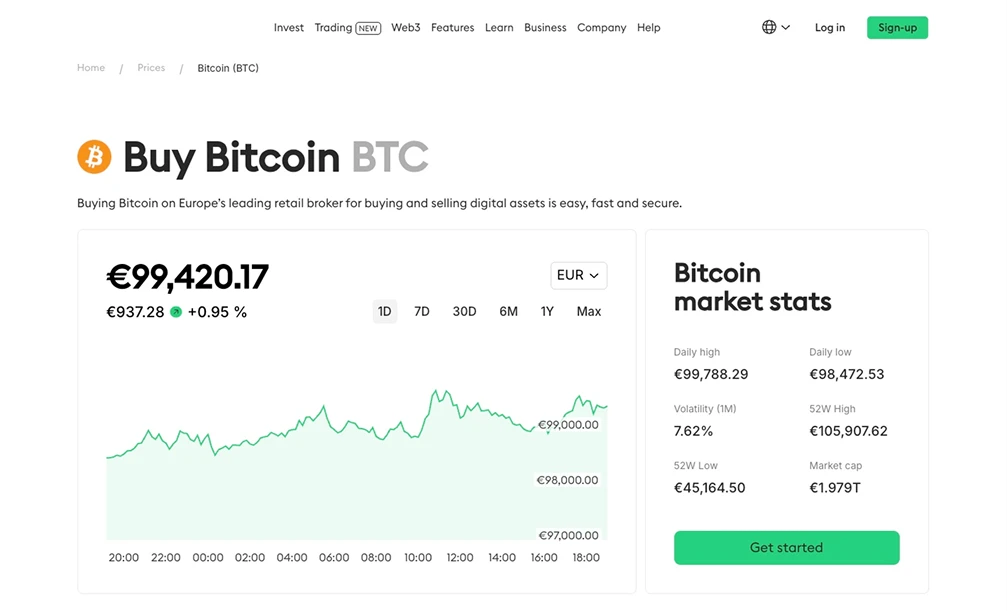
3. Bybit
Bybit is the preferred platform for advanced crypto derivatives trading, recognized for its extensive range of innovative features and reliable performance. Launched in 2018, it is home to over 74 million users across Austria and 160 other countries, supporting German, French, and English.
It supports 2,000+ assets for spot trading and 400+ futures contracts. Bybit stands out due to its extensive derivatives offerings, including perpetual futures contracts with leverage up to 200x, spot and futures grid trading bots, and automated strategies via TradeGPT, an AI-powered analytics feature.
Beyond trading, Bybit offers diverse financial products, such as "Bybit Earn," which includes staking, liquidity mining, lending, and borrowing services. The Bybit Card enhances user experience, providing up to 10% cashback, exclusive partner rebates, and no-fee crypto spending.
Platform Highlights:
- Fees: Spot trading fees start from 0.1%.
- Supported Assets: Over 2,000 cryptocurrencies.
- Regulation & Licensing: Adheres to MiCA regulations.
- EUR Deposit Methods: SEPA bank transfers, credit cards, debit cards, Zen, Google Pay, Apple Pay.
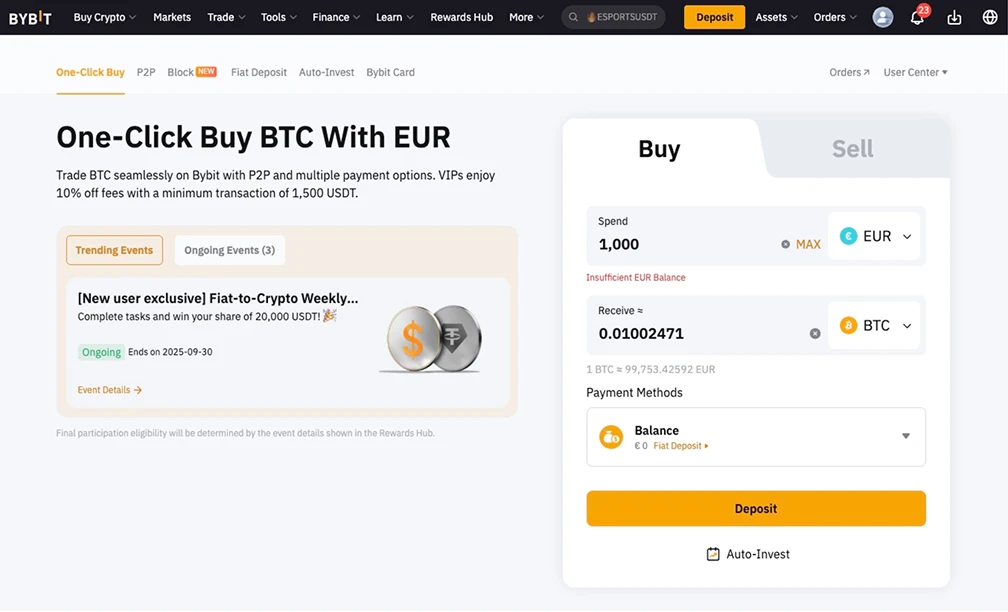
4. Uphold
Uphold is an ideal platform for beginners thanks to its simplicity, flexibility, and high security standards. Since its inception in 2014, it has established itself as a leader in transparency by providing real-time proof of reserves and openly publishing asset and liability balances every 30 seconds.
A standout feature of Uphold is its one-step trading capability, enabling direct asset exchanges without intermediate steps. The platform also offers extensive crypto staking opportunities, allowing users to earn up to 16.1% APY with instant staking and unstaking available for more than 20 crypto assets.
Uphold’s security framework is among the best, with certifications including SOC 2 Type 2, ISO 27001, and PCI DSS. The exchange strictly complies with EU regulations, ensuring data privacy for users. Uphold’s user-friendly mobile app further simplifies trading, asset management, and tracking.
Platform Highlights:
- Fees: Transparent spreads averaging around 1 - 1.5%.
- Supported Assets: Over 250 cryptocurrencies.
- Regulation & Licensing: Adheres to MiCA regulations and is licensed in Europe.
- EUR Deposit Methods: SEPA bank transfers, credit cards, debit cards, Apple Pay, Google Pay.

5. Binance
Binance is favored for its extensive asset selection, low fees, and comprehensive trading features. Established in 2017, it has emerged as the world's leading cryptocurrency platform, trusted by over 280 million users across 180 countries, with daily trading volumes frequently exceeding $30 billion.
The platform provides an unmatched variety of trading opportunities, including spot, margin, and futures markets, covering over 500 cryptocurrencies. Binance also hosts advanced trading products such as perpetual contracts and leveraged tokens, alongside peer-to-peer (P2P) crypto transactions.
Binance continually expands its ecosystem, integrating new products such as Binance Launchpool for token launches, Binance NFT marketplace for digital collectibles, and Binance Earn offers investors passive income opportunities, featuring staking, yield farming, and flexible savings products.
Platform Highlights:
- Fees: Spot trading fees start from 0.1%, further reduced with BNB token discounts.
- Supported Assets: Over 500 cryptocurrencies.
- Regulation & Licensing: Holds a MiCA license and is regulated across Europe
- EUR Deposit Methods: SEPA transfers, credit cards, debit cards, Apple Pay.
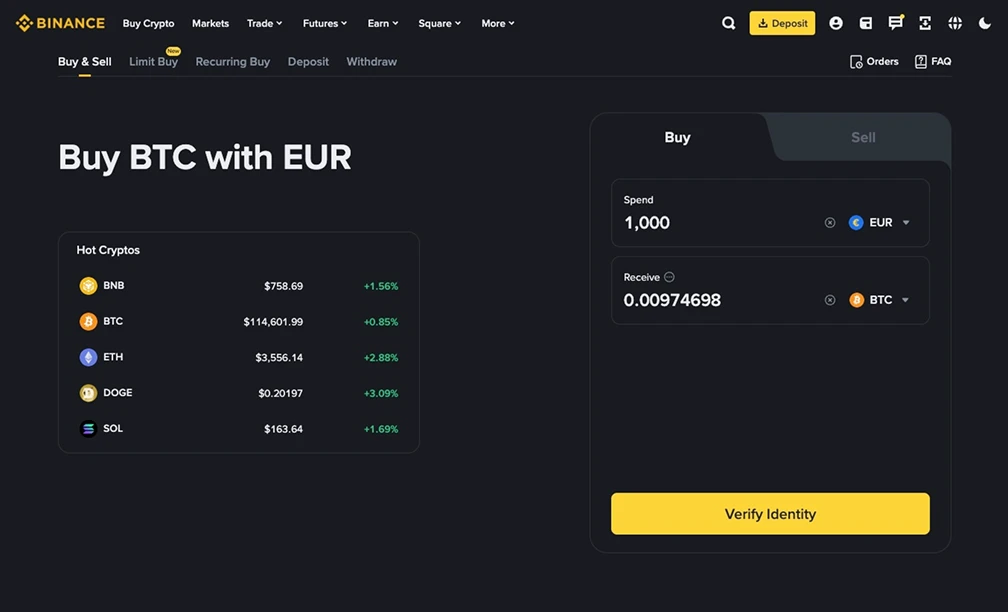
6. KuCoin
KuCoin is highly popular among Austrian crypto investors seeking extensive altcoin options, intuitive trading tools, and solid security measures. The platform has over 40 million registered customers across over 200 countries, with daily trading volumes exceeding $5 billion across both order books.
Austrian traders benefit from KuCoin’s robust product lineup, including spot trading with access to over 900 crypto assets, futures contracts, leveraged tokens, and comprehensive margin trading features. Additionally, KuCoin offers automated investment solutions through advanced trading bots.
KuCoin Earn further enhances the user experience by providing yield-generating opportunities for steady passive income. The exchange maintains strict security standards, backed by robust encryption, strong account protections, and Proof of Reserves (PoR) audits for transparent asset management.
Platform Highlights:
- Fees: Spot trading fees start at 0.1% with further discounts available through KCS token usage.
- Supported Assets: Over 900 cryptocurrencies.
- Regulation & Licensing: Adheres to MiCA standards.
- EUR Deposit Methods: Debit cards, credit cards, Google Pay, Apple Pay.
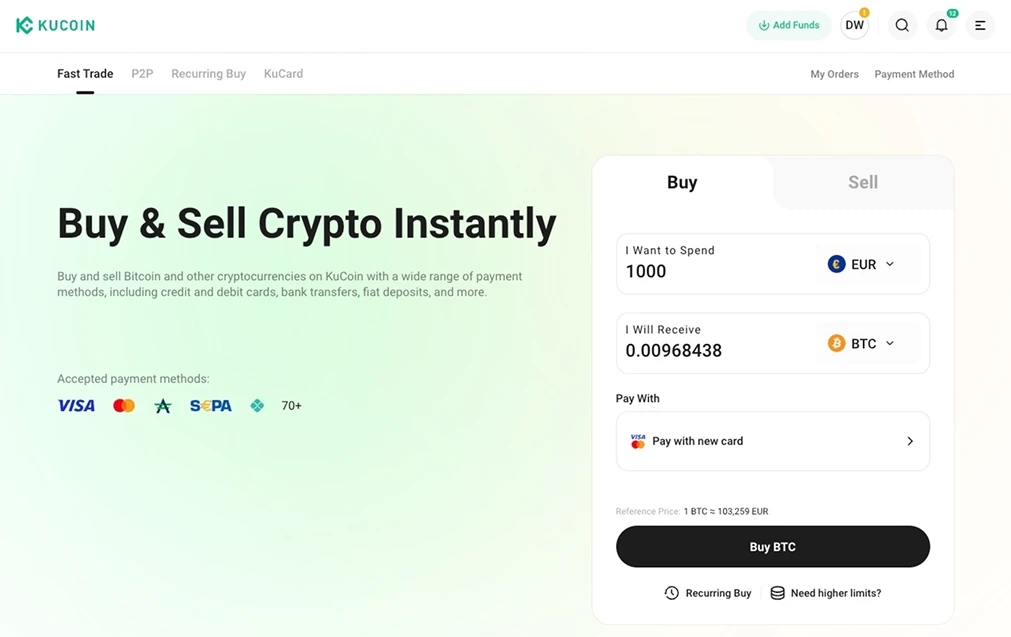
Is Crypto Regulated in Austria?
Yes, Austria has a defined legal framework, enforced by the Financial Market Authority (FMA), which is the national authority. After the Markets in Crypto‑Assets Regulation (MiCAR) became fully applicable on 30 December 2024, the FMA took over licensing, ongoing supervision, and enforcement of all crypto‑asset service providers (CASPs) operating in the country.
Under MiCAR, crypto platforms, custodial services, and issuers of digital assets must obtain official registration or licensing from the FMA, adhere strictly to anti-money laundering (AML) and know-your-customer (KYC) policies, and maintain transparent investor protection practices.
How is Crypto Taxed in Austria?
Cryptocurrency taxation in Austria is clearly defined by the Austrian Federal Ministry of Finance, providing investors with specific guidance on how various crypto transactions and earnings are taxed. Below is a breakdown of the taxes applied to cryptocurrency activities:
- Capital Gains Tax: There is a 27.5% tax applied to profits from selling cryptocurrencies for euros (EUR). Triggered by using cryptocurrencies for the purchases of goods and services. Includes gains from crypto lending, liquidity provision, staking, and mining rewards.
- Income Tax: Staking, liquidity mining, and mining rewards are taxed immediately upon receipt at the flat 27.5% rate.
Finally, looming on the horizon is the EU’s DAC8 directive, underpinned by the OECD’s Crypto‑Asset Reporting Framework (CARF). Starting 1 January 2026, Crypto‑Asset Service Providers in Austria and across Europe will collect and share detailed data on account holders, which will help detect cross‑border evasion and enhance transparency.
Cryptocurrency Adoption in Austria
Cryptocurrency adoption in Austria continues to expand significantly, supported by clear regulatory frameworks, growing acceptance among local businesses, and strong consumer confidence.
User engagement is notably high, with 67.88% of the Austrian population projected to use cryptocurrencies in 2025, increasing to 70.50% the following year, representing about 6.42 million active users.
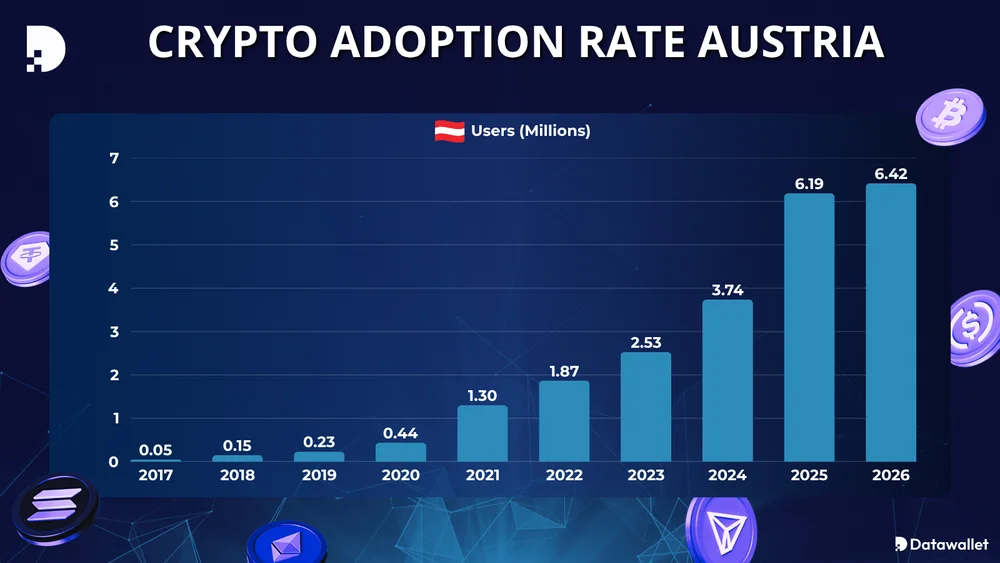
How to Buy Bitcoin in Austria
For investors in Austria looking to purchase Bitcoin (BTC), it's important to choose fully regulated crypto exchanges compliant with the Austrian Financial Market Authority (FMA) and EU MiCA regulations. Here's a simple guide on how Austrian investors can buy Bitcoin:
- Select a Platform: Start by picking a reputable exchange licensed under Austria’s FMA and compliant with MiCA standards, such as Bitpanda or Kraken.
- Create Your Account: Sign up on the chosen platform and verify your identity through the mandatory Know Your Customer (KYC) process. This requires valid identification such as an Austrian ID card, passport, or driver’s license, alongside proof of address.
- Deposit Euros: Deposit funds into your account using supported payment methods in Austria. Common options include SEPA bank transfers, instant bank transfers (EPS), credit or debit cards, and popular digital payment services like PayPal or Skrill.
- Buy Bitcoin (BTC): Once your account is funded, locate the Bitcoin trading section on the exchange. Enter the amount of euros you'd like to invest, or specify the quantity of Bitcoin you intend to purchase, and finalize your order after reviewing all details.
After completing the purchase, it's advisable to promptly transfer your Bitcoin from the exchange into a secure personal wallet. Hardware wallets like Ledger or Trezor offer the strongest security, but reputable software wallets are also sufficient for safely managing your crypto assets.
Final Thoughts
Austrian crypto investors benefit significantly from clear regulations and high-quality exchanges tailored to diverse needs, from beginner-friendly Uphold to advanced platforms like Kraken and Bybit.
Before choosing an exchange, consider your trading style, preferred features, and security requirements carefully. By aligning your personal investment strategy with Austria’s robust regulatory framework and trusted platforms, you can confidently enter or grow your presence in the crypto market.
Frequently asked questions
Can I use decentralized crypto exchanges (DEXs) in Austria?
Yes, decentralized exchanges like Uniswap and PancakeSwap are accessible in Austria. However, these platforms are typically unregulated under MiCA, meaning users assume higher risks regarding security and asset protection.
Are crypto transactions anonymous in Austria?
Crypto transactions in Austria are pseudonymous rather than fully anonymous. Under EU MiCA regulations, regulated exchanges require KYC verification, ensuring that transactions can be traced for tax reporting and anti-money laundering compliance.
Do Austrian banks support cryptocurrency transactions?
Yes, many Austrian banks support crypto-related transactions, particularly via regulated exchanges like Bitpanda and Kraken. However, some banks may restrict transfers to unregulated platforms, so checking your bank's policy first is recommended.
What transaction records should Austrian crypto users keep for tax compliance?
Maintain the dates, amounts, and euro‑value of every crypto purchase/sale, wallet addresses, staking payouts, and year‑end tax statements issued by exchanges. These details enable accurate capital gains computation, cost basis tracking, and proof of loss carry‑forwards.
%2520(1).webp)
Written by
Antony Bianco
Head of Research
Antony Bianco, co-founder of Datawallet, is a DeFi expert and active member of the Ethereum community who assist in zero-knowledge proof research for layer 2's. With a Master’s in Computer Science, he has made significant contributions to the crypto ecosystem, working with various DAOs on-chain.

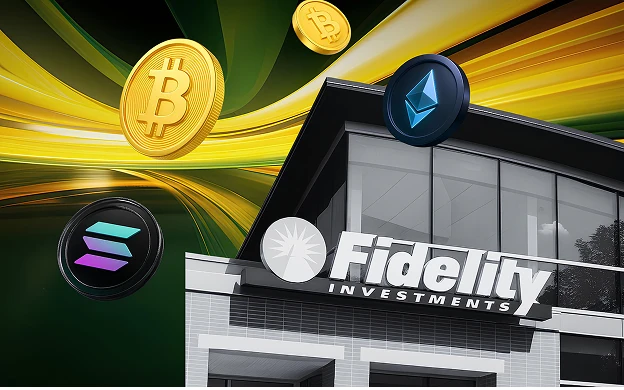
%25201%2520(1).webp)
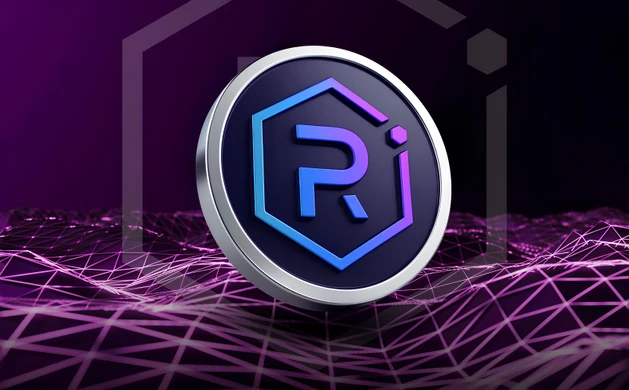
.webp)
.webp)




